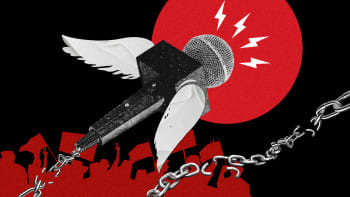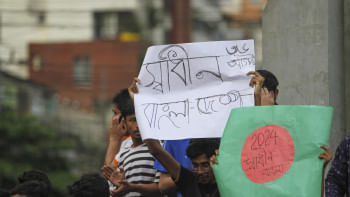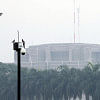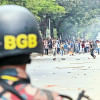A turning point or a missed opportunity?

In an article published on July 7, in relation to the Awami League's mass corruption, I wrote that ordinary citizens have only two options left. One, allow it to cost them in every sphere of life—literally ruining their lives and turning them into slaves on whose backs those in power could continue to live their lavish lives. Two, form mass movements to change things. Given the political reality back then, for anyone from within the local media to call for the "formation" of mass movements was perhaps riskier than it appeared from the outside—whether it be from real or perceived threats.
Nevertheless, the reason why I wrote this was quite simple: the writing was on the wall. By that I don't mean that it was obvious that the mafia-like AL regime would fall. Indeed, there had been moments previously when I personally felt that, only to be proven wrong. But what was obvious from an economic side of things—in addition to the other grievances people had because of the regime's arrogant, oppressive and shameless behaviour—is that we were at a crossroads. Through absurd levels of corruption, the parasitic mafia class was destroying every avenue of real wealth production and producers, i.e. the hardworking citizens of this nation they scrounged off from. And without some form of imminent radical change, we were on the verge of falling off an economic cliff.
Given this and other realities, the fall of the AL regime is indeed something to celebrate. However, the mess it has left behind is not going to be easy to clean up. Take, for instance, the massive amount of wealth that has been syphoned out of the country. According to TIB Executive Director Dr Iftekharuzzaman, some $12-15 billion was laundered from the country annually under the former regime. Over the AL's 15-plus years in office, this adds up to somewhere between $180 billion and $225 billion.
The government-commissioned white paper on the economy takes it a step further, estimating that $234 billion was syphoned out of Bangladesh in 2009-2023. However, given the difficulty of estimating the true extent of the laundering—because of the complexity of the crime—even that may be an underestimation.
Another TIB finding suggests that people paid an estimated Tk 1.46 lakh crore in bribes to get services under the AL regime. Not only does such widespread corruption impose enormous social and economic costs on a nation, but it also imposes a heavy philosophical cost due to the scale of immorality that people are forced to participate in. After all, when you remove all morality from society, the only remaining, logical move for individuals is to act without morals—its just simple game theory.
There are endless examples of past AL corruption and warning signs at present that show the economy is in substantial trouble. Therefore, both the interim government and the people as a collective must prioritise turning it around.
What's disappointing, however, is that since the AL's ouster, the interim government has been forced to divert its attention from one less relevant issue—or a completely irrelevant one—to another. Non-stop protests on various issues have been causing further harm to the economy. While some of these protests were perhaps for legitimate demands, it seems people have again lost sight of the bigger picture.
Across social media platforms in particular, the political left and right seem to be constantly battling each other—and dragging everyone else into their fights. While I believe the battle between ideas is almost always a good thing, at this time, it must not come at the cost of our priorities.
Even though we say that in a democratic society, power, ideally, is supposed to belong to the people, reality isn't always that. It belongs to the elected representatives of the people and state machinery. Power only belongs to the people when the people unite to collectively exercise it—which alone can challenge the state machinery and those wielding its massive influence—like they did during the July uprising to oust the fascist AL government.
Having ousted the former regime, if the people lose their unity before cleaning up the mess left behind and creating a system that rewards moral individuals over immoral ones—one based on the rule of law in which justice prevails—then the spirit of July uprising will remain unrealised.
Right now, it seems that there is a race going on between certain individuals/groups/ideologues to claim the credit for ousting the AL government. However, we must not forget that if people with whom we don't fully (or at all) agree with did not take to the streets along with us during those July days, we would not have been able to break the shackles of AL fascism.
Another important reason to avoid infighting is that, in today's interconnected world, external powers can most easily interfere in a country's internal affairs when there is a lack of unity. Bangladesh has a history of being exploited by outside forces because its people have often failed to set aside their differences to focus on protecting the nation's sovereignty. Blaming those foreign forces serves little purpose—this is the nature of realpolitik. It is our responsibility to ensure we don't leave ourselves vulnerable to such threats.
Sometimes, in our efforts to tear down the walls of oppression, we forget that we must also build the walls of truth and justice. It is equally important to see through the euphoria of victory we are currently experiencing, just as it was to see through the despair during the darkness of oppression.
At this moment, we must be able to see what comes next, and we must not allow ourselves to be so intoxicated by the moment so that we forget what we are supposed to be building. This is the least we can do to honour the sacrifices of the martyrs of the July uprising—and those who gave their lives before it—to create a better Bangladesh. A Bangladesh where everyone, except for outright psychopathic criminals, has a place and a future, regardless of their differences.
Eresh Omar Jamal is deputy head of editorial at The Daily Star. His X handle is @EreshOmarJamal.
Views expressed in this article are the author's own.
Follow The Daily Star Opinion on Facebook for the latest opinions, commentaries and analyses by experts and professionals. To contribute your article or letter to The Daily Star Opinion, see our guidelines for submission.

 For all latest news, follow The Daily Star's Google News channel.
For all latest news, follow The Daily Star's Google News channel. 










Comments